OR 2017 in Berlin
von BERNARD FORTZ, BRUSSELS
The annual international conference of the German Operations Research Society (GOR), OR2017, took place in Berlin, Germany, September 6 – 8, 2017 at the Freie Universität Berlin. The theme of the conference was »Decision Analytics for the Digital Economy«. Continuing the tradition established in recent editions, participants could enrich classical operations research topics with current emerging disciplines such as machine learning and artificial intelligence techniques.
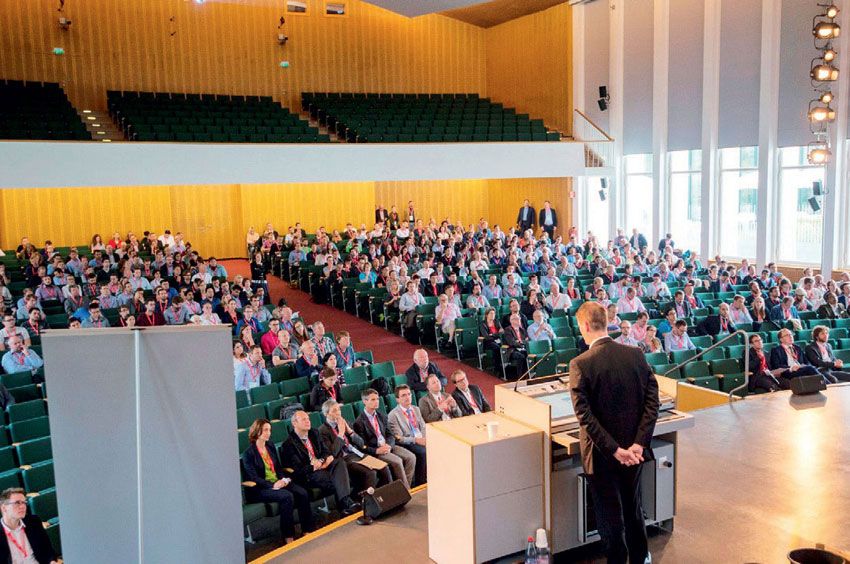
More than 900 participants from 46 countries were offered a scientific program with more than 230 parallel sessions and 585 talks, highlighted by two brilliant plenary lectures and a very diversified set of semi-plenary lectures.
After a friendly get-together on Tuesday night in the beautiful forecourt of the Henry-Ford Building, the conference was opened on Wednesday, 5 September, by Klaus Hoffmann-Holland, vice president of Freie Universität Berlin, and by Andreas Löffler and Holger Reich, deans of the Economics and Mathematics faculties, respectively. The scientific program started with the plenary lecture by Richard Eglese (The Management School, Lancaster University, UK) on »Green Logistics: Decision Analytics for Sustainable Transportation«.
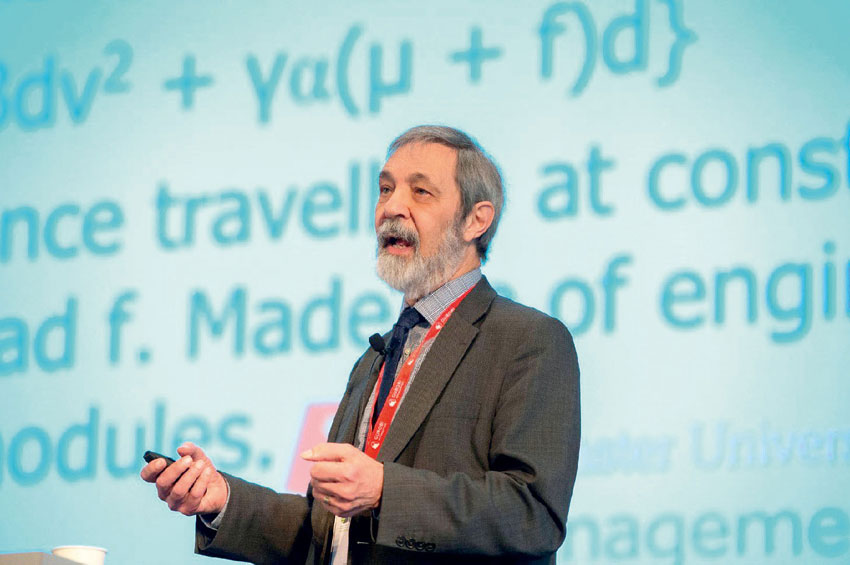
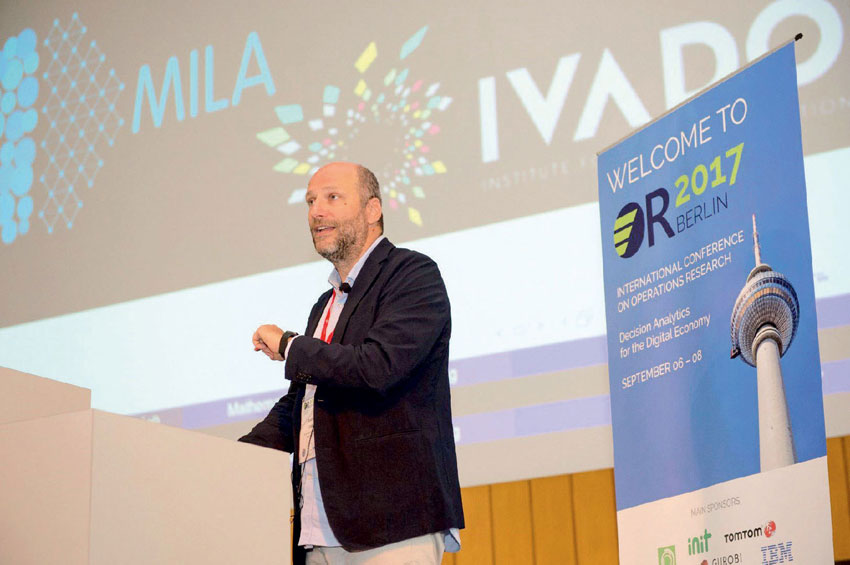
The second plenary session entitled »On Big Data, Optimization and Learning« took place during the closing session on Friday. Andrea Lodi (École Polytechnique de Montréal, Canada) gave a very nice insight on the importance of a tight integration of Machine Learning and Mathematical Optimization. The talk first concentrated on the two symmetric questions »What can optimization do for machine learning?« and »What can machine learning do for optimization?« before focusing on new applications that can be solved by the combination of machine learning and optimization.

The diversity in Operations Research techniques and addressed problems, and the need to integrate closely with other emerging domains, were very well illustrated by the eleven semi-plenary presentations. These highlights of the three-day scientific program left the participants with a very difficult choice among an excellent offer.
On Wednesday, in addition to the presentation by the GOR Science Award Winner, participants could choose between the following presentations:
- Models and Optimization in Shared Mobility Systems, by Dirk Christian Mattfeld, Technische Universität Braunschweig.
- Optimization meets Machine Learning, by Marco Lübbecke, RWTH Aachen University.
- Market Design: A Linear Programming Approach, by Martin Bichler, Technical University of Munich.
On the second day of the conference, the four semi-plenary talks were: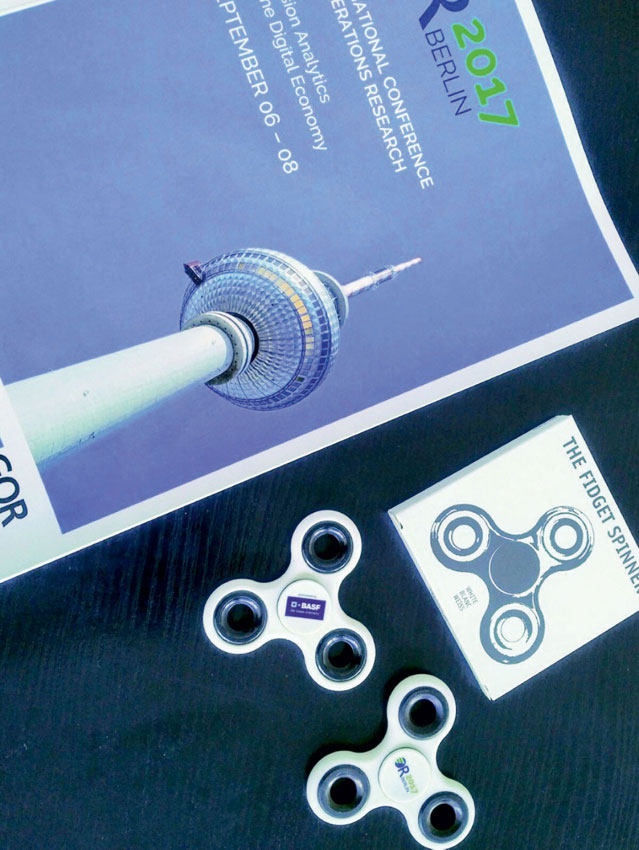
- Meta-Algorithms, by Meinolf Sellmann, Global Research, General Electric.
- Data Analytics, Machine Intelligence and Digitalization at Siemens by Hans Georg Zimmermann, Siemens AG.
- Network Flow Problems with Physical Transport, by Alexander Martin, FAU Erlangen-Nürnberg.
- Last Mile Logistics, by Arne Karsten Strauss, University of Warwick.
Four additional semi-plenary talks took place during the final day of the conference:
- Blood Supply Chains: Challenges for the Industry and How Operations Research Can Help, by Anna Nagurney, University of Massachusetts Amherst.
- The Rise of Artificial Intelligence in Forecasting? Hype vs real world Success Stories by Sven F. Crone, Lancaster University Management School.
- Route Planning in Transportation – New Results and Challenges by Dorothea Wagner, Universität Karlsruhe (TH).
- Improving on-time performance at Deutsche Bahn by Christoph Klingenberg, Deutsche Bahn AG.
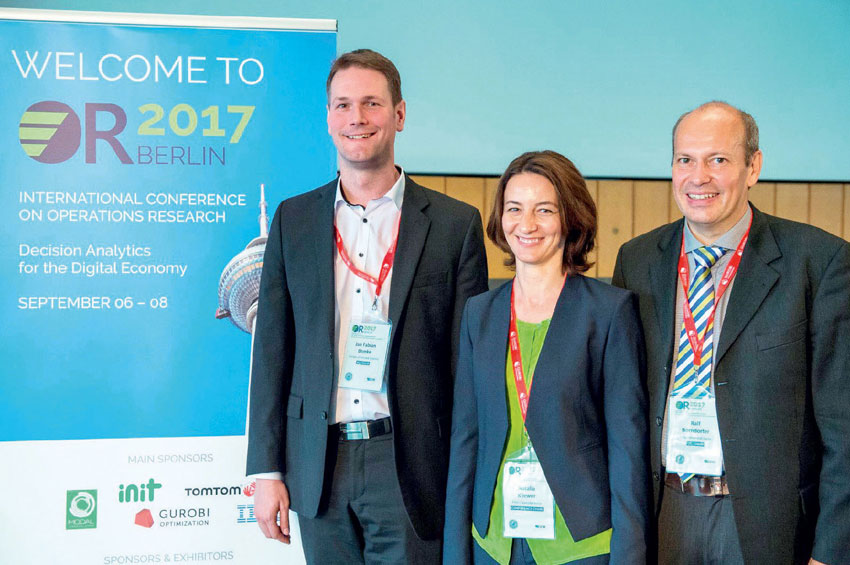
The first day of the conference also focused on success stories from the practice of the OR and Business Analytics. The Business Track included exciting and motivating lectures from the following practitioners: Michael Beck (init SE); Patrick Briest (McKinsey & Co.) & Ingmar Steinzen (ORCONOMY GmbH); Michael Feichtenschlager (inola GmbH); Michael Frank (opremic solutions); Alexander Bradle, Alexander Paar and Stephan Blankenburg (TWT GmbH), Clément Pajean (LocalSolver); Adam West, Paul Hart and Christina Burt (Satalia); Heike Schilling (TomTom); Sebastian Fink and Sofiane Oussedik (IBM) as well as the prize award session of the »Mobility Maximization Mission« Hackathon (Gurobi and Tom Tom).
During coffee breaks, there was also ample opportunity for an exchange with leading providers of analytics and optimization software companies in the exhibition area.
With the support of some GOR related companies, prestigious awards were distributed during the opening session.
The Scientific Prize of GOR – supported by INFORM GmbH, Aachen since 2005 – is the most important prize awarded by GOR. It is awarded to a scientist for outstanding achievements in the development of operations research and acknowledges the overall work of the laureate. In Berlin, the 2017 Scientific Prize was awarded to Prof. Dr. Erwin Pesch.
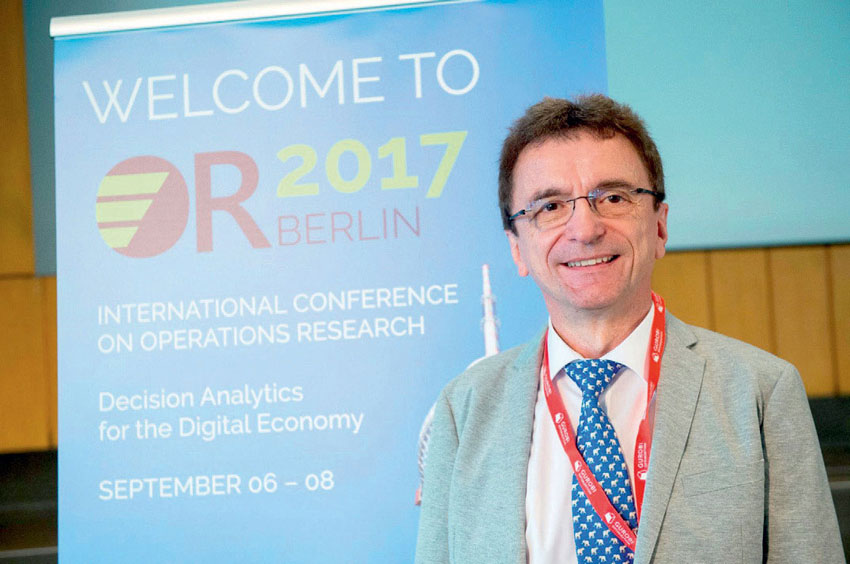
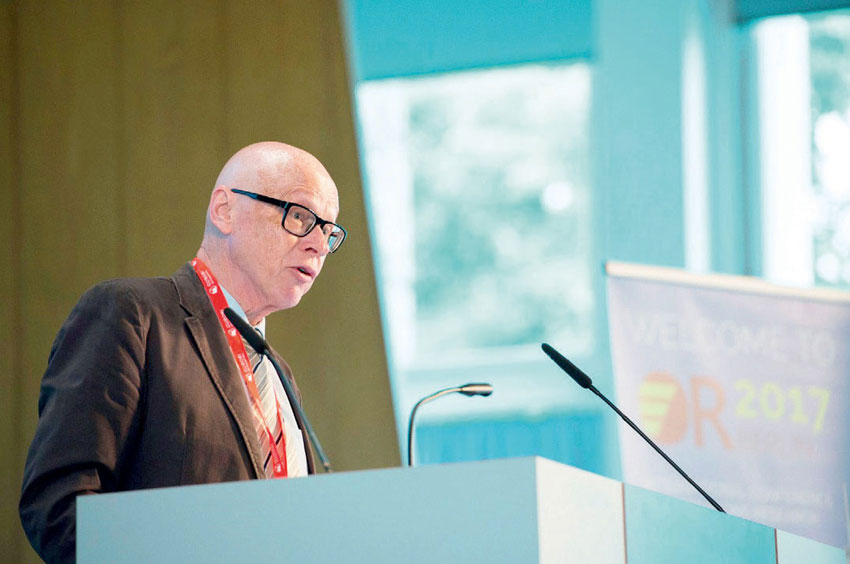
With the financial support of GAMS software GmbH, the selection committee, under the direction of Stefan Ruzika, has selected the following master theses for the GOR Master Thesis Prize:
- Felix Happach: Stable Clusterings and the Cones of Outer Normals (TU München, supervisor: Prof. Dr. Steffen Borgwardt)
- Adam Schienle: Solving the Time-Dependent Shortest Path Problem on Airway Networks Using Super-Optimal Wind (FU Berlin, supervisor: Prof. Dr. Ralf Borndörfer)
- Markus Seizinger: The two dimensional bin packing problem with side constraints (Universität Augsburg, supervisor: Prof. Dr. Jens O. Brunner)
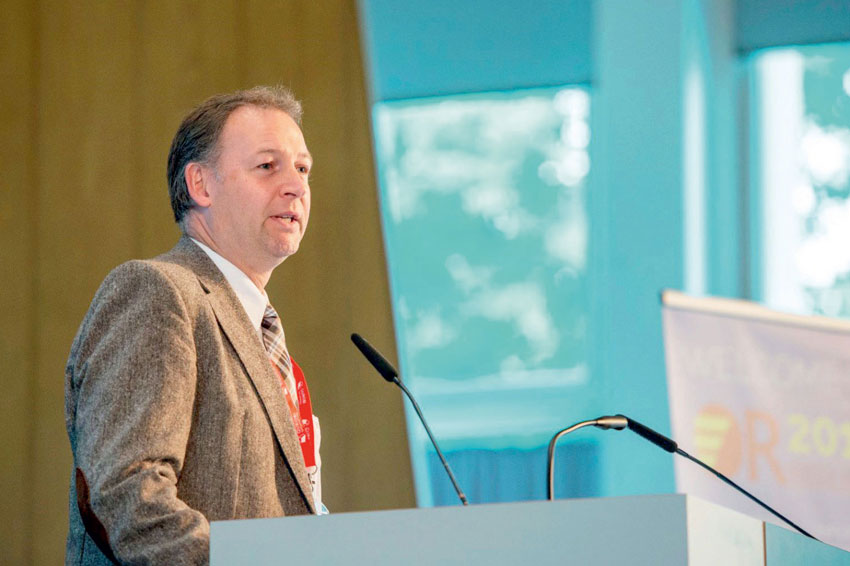
For the GOR Dissertation Prize, with financial support from Siemens AG, the jury led by Peter Letmathe selected:
The following papers have been submitted in this session:
- Pirmin Fontaine: Methodological Advances and New Formulations for Bilevel Network Design Problems (TU München, supervisor: Prof. Dr. Stefan Minner)
- Igor Kozeletskyi: Game-theoretic Approaches to Allocation Problems in Cooperative Routing (Universität Duisburg-Essen, supervisor: Prof. Dr. Alf Kimms)
- Kevin Schewior: Handling Critical Tasks Online: Deadline Scheduling and Convex-Body Chasing (TU Berlin, supervisor: Prof. Dr. Nicole Megow)
- Marlin Wolf Ulmer: Anticipation in Dynamic Vehicle Routing (TU Braunschweig, supervisor: Prof. Dr. Dirk Christian Mattfeld)
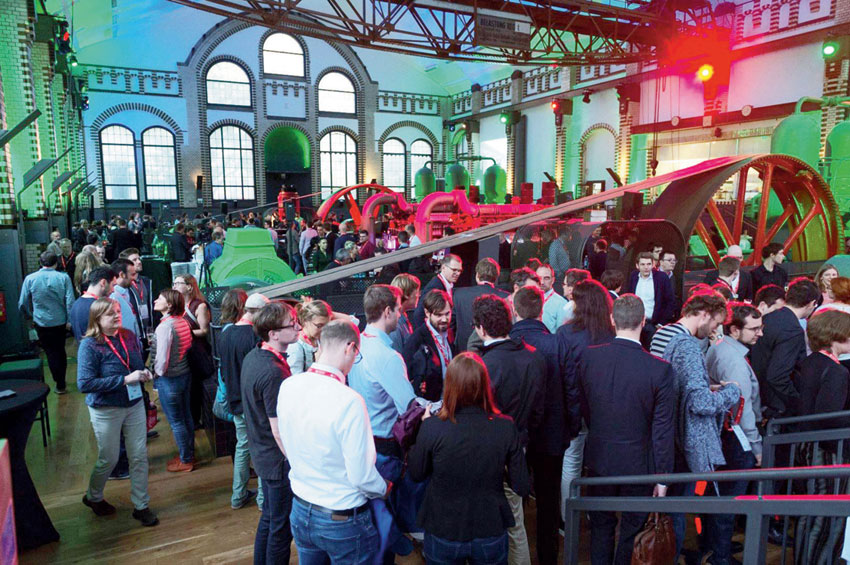
In addition to the diversified scientific program, many opportunities were given for networking and creating new links between the scientific and the professional communities. This nice atmosphere was enhanced by a rich range of social activities. After a relaxed get-together on the eve of the conference, the welcome reception on Wednesday night took place in the machine hall of the Wasserwerk Berlin on Wednesday night. This historical place built about 100 years ago impressed the conference participants with its water pumps. The reception was welcomed a great success by many conference participants.
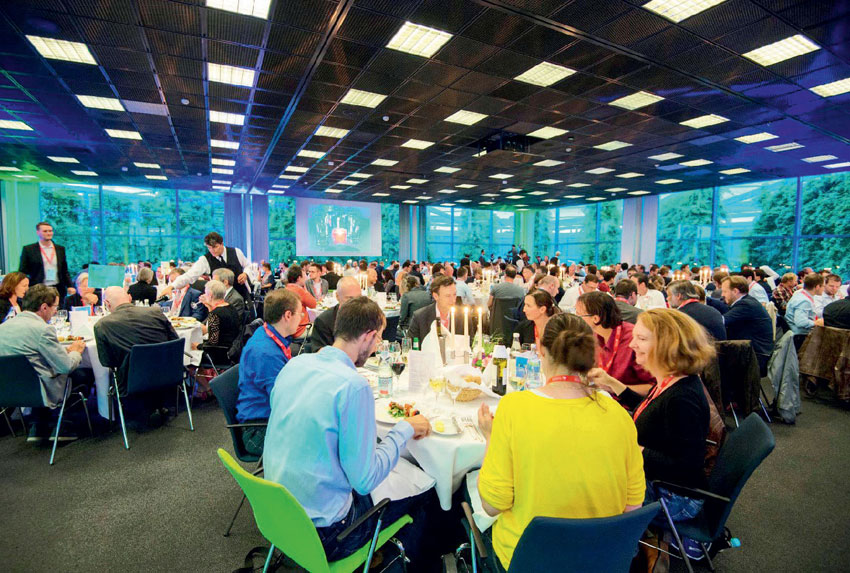
After the GOR General Assembly on Thursday evening, the conference dinner took place at the conveniently located Seminaris CampusHotel Berlin, in close proximity to the conference venue. Participants could already recall the highlighting moments of the conference by enjoying pictures taken during the conference, accompanied by entertaining live music, before enjoying a diversified food buffet.
The OR 2017 conference was definitively a huge success, both scientifically and socially. On behalf of all conference participants, I would like to warmly thank the meeting organizers Natalia Kliewer, Jan Fabian Ehmke and Ralf Borndörfer, as well as their whole support team, for the excellent, perfectly organized program and for the beautiful days in Berlin.

In 2018, the conference will be for the first time co-organized with the Belgian Operational Research Society (ORBEL). We look forward to seeing you again in Brussels at the OR 2018! (http://www.or2018.be, Twitter: @OR2018Brussels).

